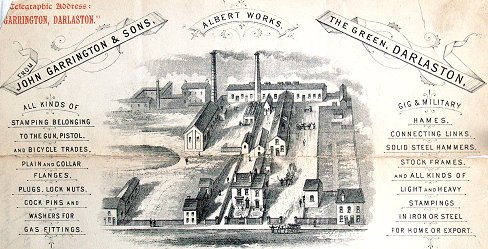
A letterhead from 1874. Courtesy of the
late David
Evans.
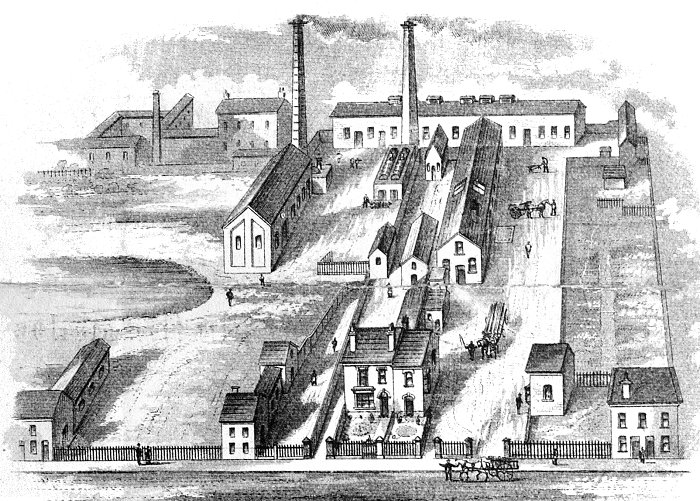
The factory in 1874.
|
Another of Darlaston's factories that closed in the
1980s recession was Garrington's forging works in
Willenhall Road. The company was founded by John Garrington
(18th May, 1799 - 1877) who set up a small stamping
business at Phoenix Works, Catherine's Cross in 1830
producing forged components for the gun trade. By
1851 the works also produced nuts & bolts and bed
screws and employed three men, including two
apprentices: Charles Tuffield (age 15 born Tamworth)
and John Camp (age 14 born Tamworth).
In 1820 John married Ann Wilkes at Wolverhampton.
They had four children: Adelaide (born c. 1932),
Fanny Garrington (born c. 1835, Richard (born c.
1835), and Benjamin Garrington (born in 1839).
In the early 1870s, the firm moved to the larger
Albert Works in Willenhall Road, where by 1881 they
employed 22 men and 10 boys. After John's death in 1877,
his two sons Richard and Benjamin took-over.
|
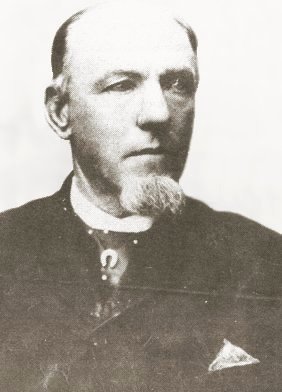
John Garrington. |
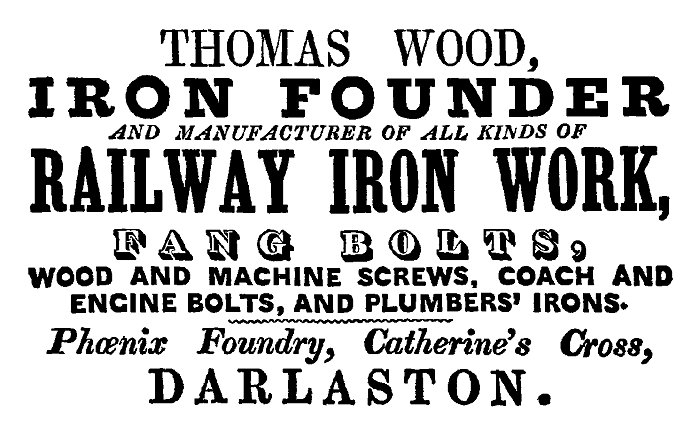
Part of Phoenix Works was
occupied by Thomas Wood, as can be seen in
this advert from Slater's Classified Directory
of the Manufacturing District, 15 Miles Around
Birmingham. Published in 1851. |
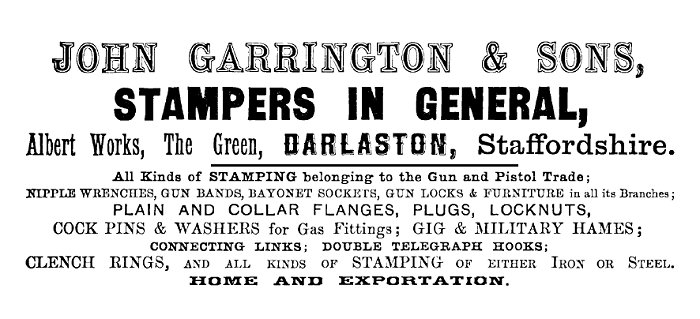
An advert from 1896.
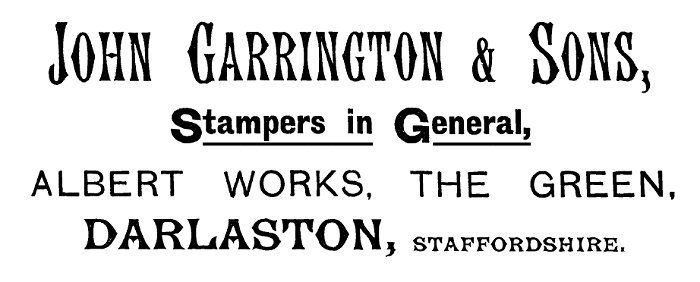
An advert from 1904.
| Richard lived at number 49 Willenhall Road with his
wife Eliza and their two children Bertram and Catherine,
and later at The Hollies, Walsall Road.
Benjamin lived at number 21 Willenhall Road with his
wife Ann and their 8 children; 3 sons and 5 daughters.
Richard died on 7th July, 1906, as can be seen in
announcement below. |
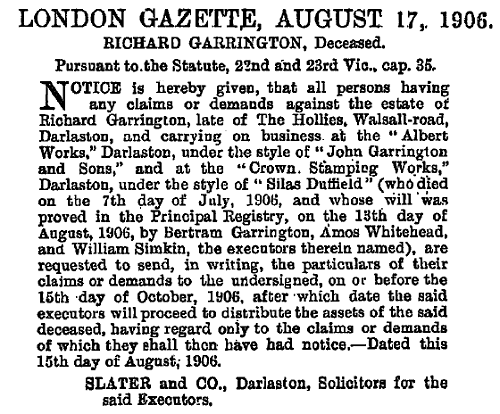 |
When the two brothers retired, Richard's son
Bertram became the senior partner, and in 1912 the
company was sold to local nut and bolt maker F.W. Cotterill. By this time the company produced
forgings for the automobile, agricultural, aircraft,
tube making, and electrical industries. |
| The inscriptions on the grave are as
follows: In memory of Eliza beloved wife
of Richard Garrington of The Hollies,
Darlaston who departing this life entered
her eternal bliss on December 22nd 1904 aged
70 years.
Also of the above Richard Garrington who
departed this life July 7th 1906 aged 71
years.
In loving memory of Catherine Jane
beloved daughter of Richard and Eliza
Garrington who departed this life December
13th 1905 aged 35 years. |
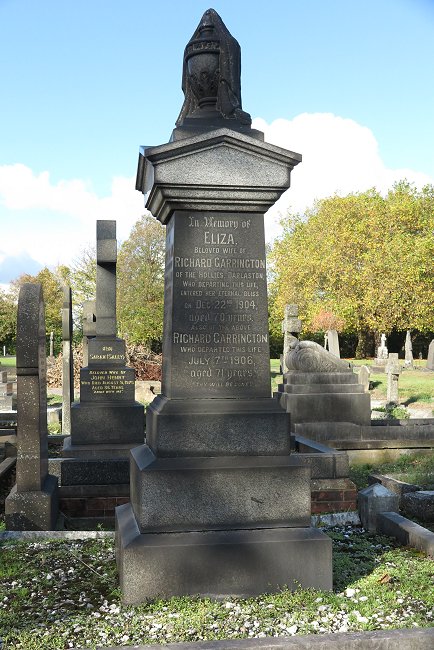
Richard Garrington's
grave at James Bridge Cemetery. |
|

A close up view of the
grave. |
|
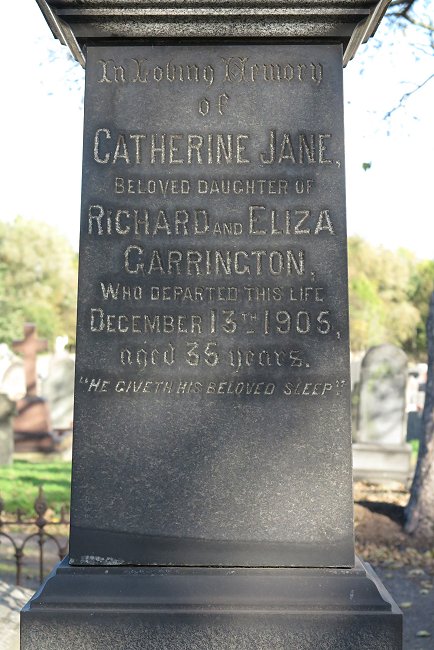
The other inscription on
the grave. |
| In 1919 the company was purchased by G.K.N. and
soon experienced problems due to lack of orders in
the 1920s slump. Things didn't improve until the mid
1930s when orders poured in from the expanding motor
manufacturing industry.
In order to cope with the
large number of orders, the works were extended at a
cost of around £100,000. Extra stamping machines
were installed along with a heat treatment plant and
a new warehouse. The work was completed in the
summer of 1939.
At the time the company produced drop forgings for
aircraft, ships, locomotives, railway construction,
vehicles, machine tools, and general engineering, in
carbon and alloy steels, and other metals. Garringtons
also specialised in heat treatment.
At this time G.K.N. considered
selling a majority interest in Garringtons to John
Harper Bean, the Tipton based car manufacturer.
|
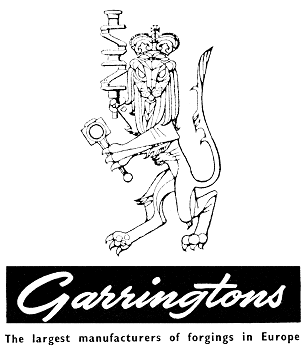 |
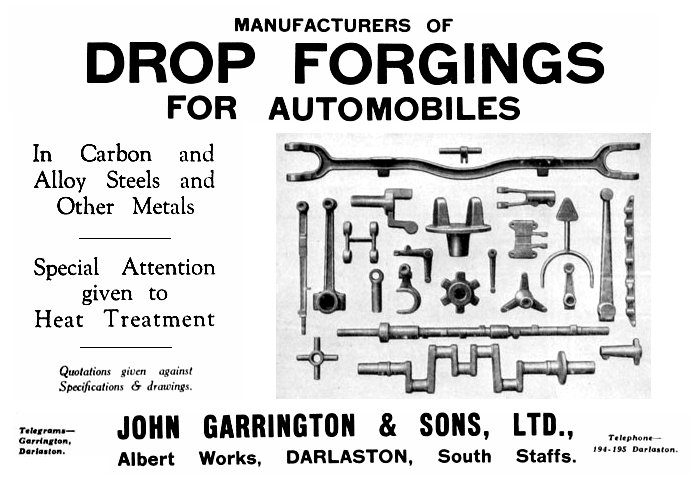
An advert from 1926.
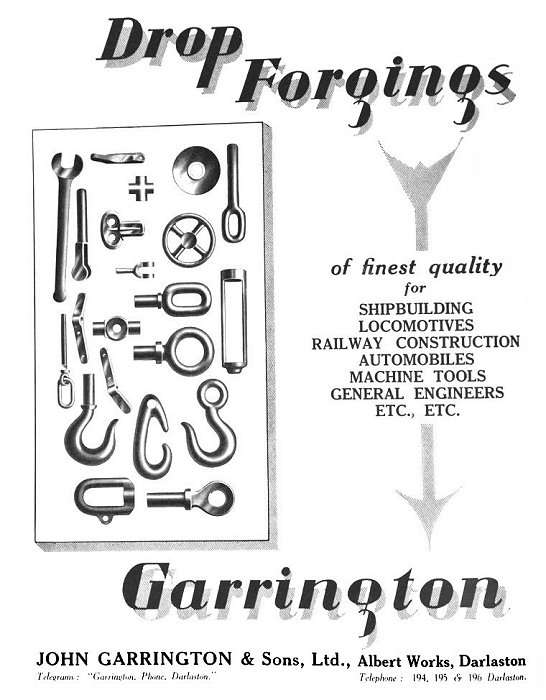
An advert from 1932.
| At the outbreak of World War II the company's
commercial activities were closely regulated by the
Government and so the scheme was dropped. G.K.N.
however, still wanted Bean's business expertise and
so the company purchased five thousand 5 shilling
ordinary shares in Beans Industries for £30,000 on
the understanding that John Bean would manage
Garringtons for four years from 1st January, 1940. In July 1940 a shell forging plant was built at
the works by the Admiralty at a cost of around
£100,000 to produce shells for the armed forces.
£261,433 was also spent on hammers, presses and
other plant by the Government. Also during the year,
Company Director and General Manager, Albert Beech
retired and was succeeded by Raymond P. Brookes and
J. C. Beech who were joint general managers.
|
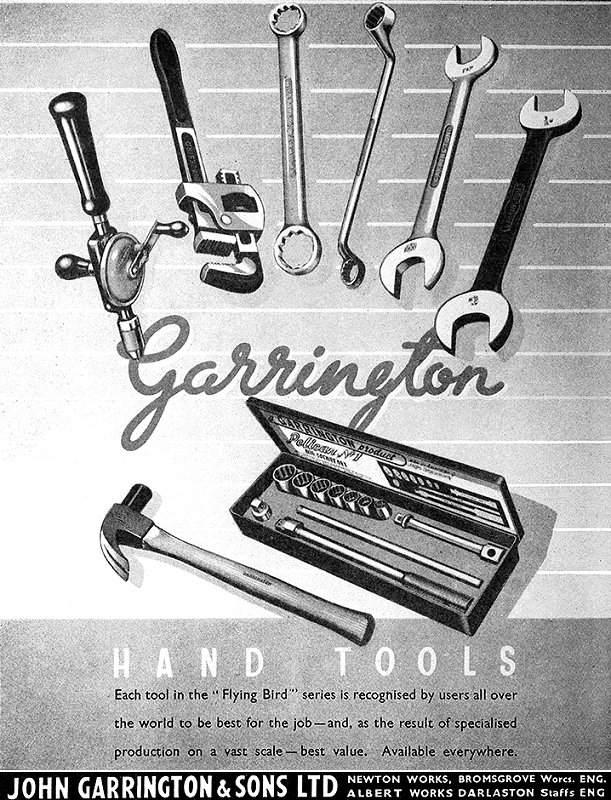
An advert from 1949.
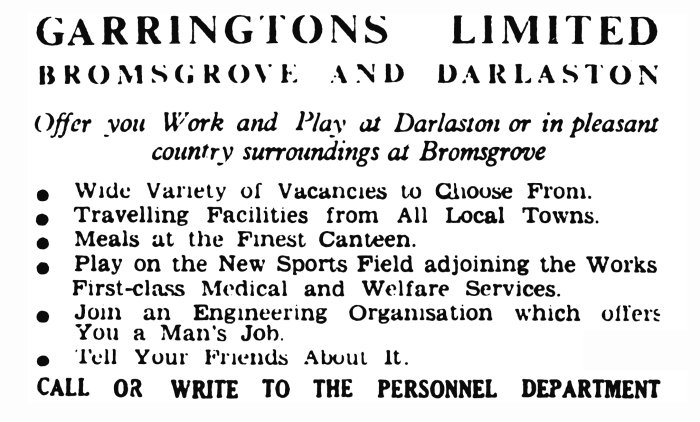
An advert from 1955.
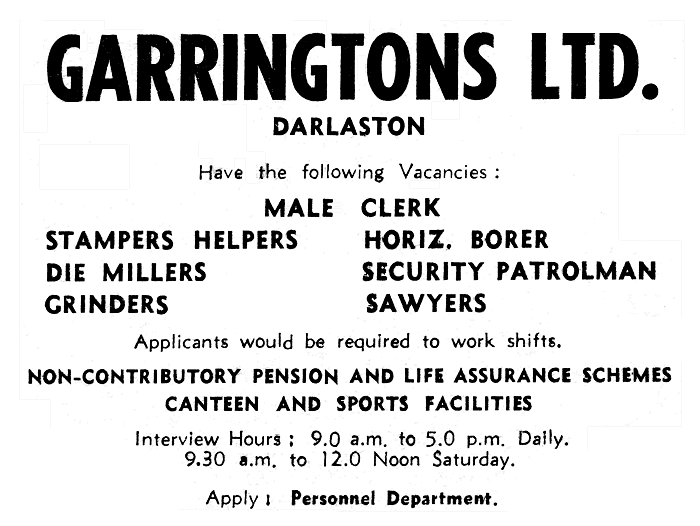
An advert from 1965.
| In 1944 G.K.N. negotiated with the Ministry of
Supply to purchase the machinery and plant installed
by the Government for £104,573 and to purchase the
building erected by the Admiralty for £40,000.
Adjacent land belonging to Tildsleys was also
purchased to provide space for expansion and
despatch facilities. New Massey hammers were
installed to replace the older machinery and
attempts were made by G.K.N. to sell the enlarged
and improved works, but there were no potential
buyers. The decision was then taken to keep the
company, and with this in mind John Bean was offered
a directorship of G.K.N. and the company entered one
of its most expansive and successful periods. |
| They produced all kinds of stampings at the large
factory that grew on the site. Over 100,000 tons
were produced annually for aircraft, shipbuilding,
railways, agricultural implements, mining equipment,
and road vehicles.
When the factory was in operation Willenhall Road
would vibrate as the large stamping machines operated.
The thumping noise from the machines could be heard some
distance away. People living in the nearby houses got so
used to this that they felt very uncomfortable during
the summer break when the works closed for a fortnight.
In 1946 Garringtons acquired Deritend Stamping
Limited of Newton Works, Bromsgrove in order to
expand production of castings for the automotive
industry. Newton Works eventually covered 50 acres,
and gave employment to 3,100 people. Garringtons
also specialised in a wide range of hand tools,
which were sold under many trade names including
'Raven', and 'Robin' (hand drills), 'Ball Pein',
'Curlew', and 'Adze Eye' (hammers), '11 Adjustable',
'Blackbird', 'Lapwing', 'Puffin', and 'Grebe'
(adjustable spanners), 'Jay', 'Magpie', 'Merlin',
and 'Kestrel' (spanners). |
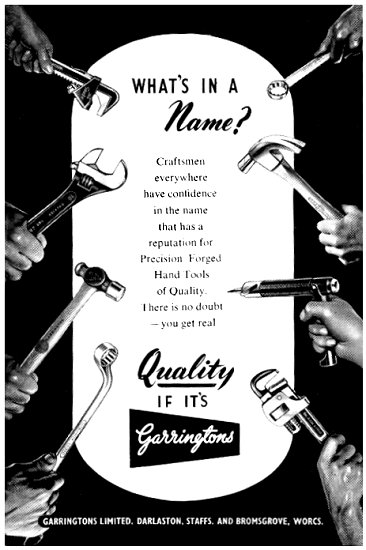
An advert from the mid 1950s.
Courtesy of Christine and John Ashmore. |
|
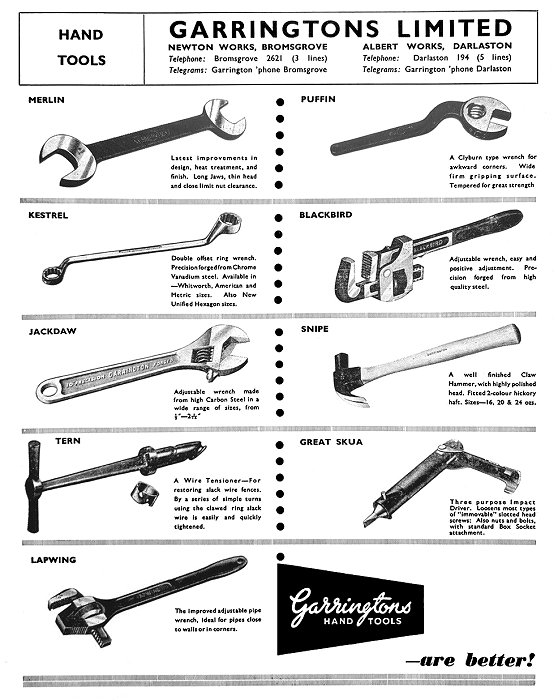
Another advert from the mid
1950s. |
|
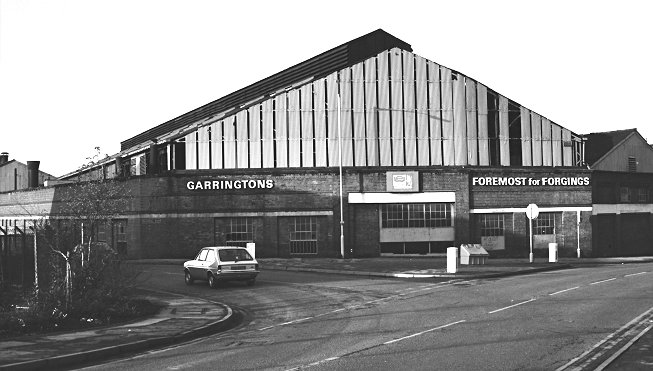
Garringtons around
the time of closure. From the Howard
Madeley collection. |
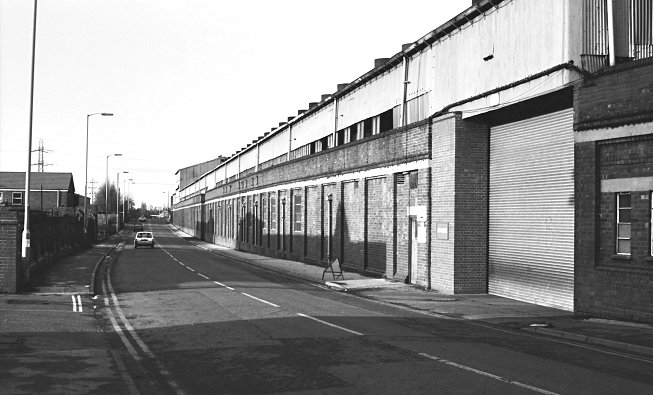
A once familiar
sight, Garringtons' factory, as seen from
Willenhall Road. From the Howard Madeley
collection. |
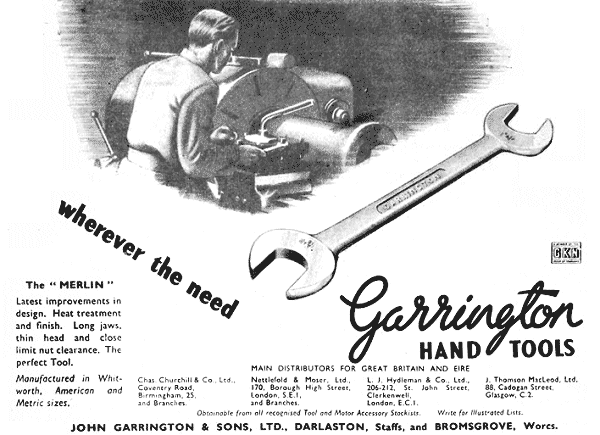
An advert from the early
1950s.
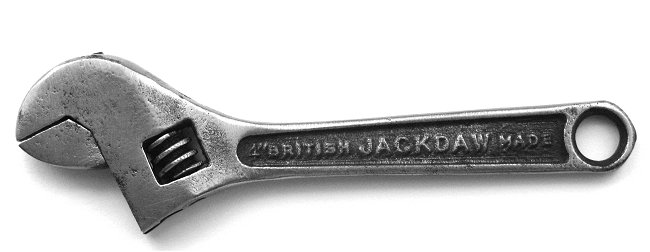
A 4 inch 'Jackdaw' adjustable
spanner.
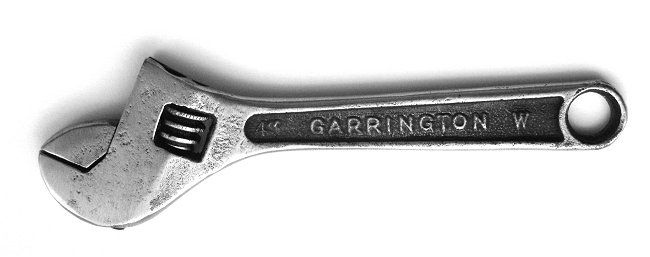
The other side of the 4 inch
'Jackdaw' adjustable spanner.
The Darlaston factory closed during the recession
of the late 1970s and early 1980s. The Bromsgrove
factory was acquired by United Engineering Forgings,
and closed in March 2002. The site was sold for
residential housing and industrial units.
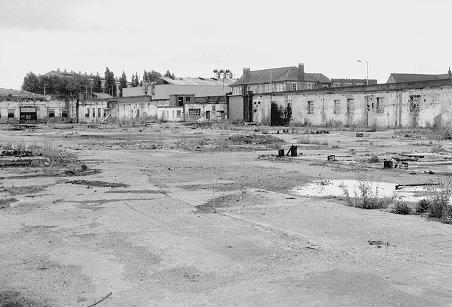
Albert Works in the late
1990s.
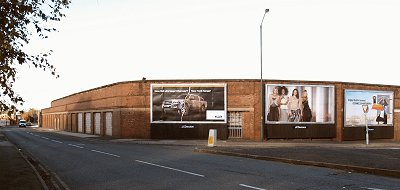
All that remains of Albert
works, now a car park. |
 |
Return to
the
previous page |
|